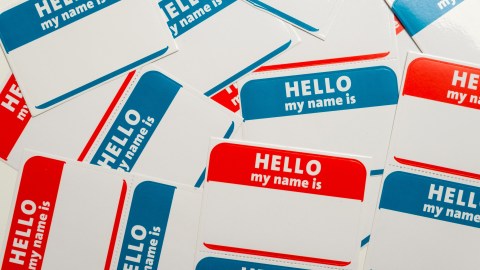Nominative determinism: Is your name shaping the course of your life?

- Nominative determinism is the idea that our names may impact our profession and character.
- In literature, this is a commonly used device, and in real life, names do seem to align with professions. Yet the causal role of names in life is still somewhat murky.
- Implicit egotism, or the unconscious tendency to choose things familiar or similar to us, might explain the connection between names and career choices.
I’ve never been particularly upset with my surname — Thomson — but it could be better, couldn’t it? I sometimes wonder who the “Thom” I’m named after was but have to conclude it’s lost in the historic fog of some ancient, Scottish town. I toyed, once, with naming my son Tom just so that if he ever had a son of his own, it would be rib-achingly funny. My wife pointed out it’s probably a faux pas to call your son Tom Thomson just for a rubbish joke in our retirement. I’ll leave you to decide who was right.
The etymological story of my surname is just so boring. I could have been an Archer, Hunter, or Fletcher. I would have taken pride in my ancestral ability to make and shoot arrows. After all, your surname meant something back in the day. For a lot of people, it meant what your life would amount to: “I’m a Baker, my daddy was a Baker, and his daddy was a Baker, too.”
Today, we’re free of such nominative traps, right? It doesn’t matter what names we’re born with; we can go and do what we want. Well, not so fast, kiddo.
Nominative determinism
Nominative determinism is the idea that your name can have some kind of impact in determining your job, profession, and even your character. A great many fictional works love to play around with nominative determinism. In Harry Potter, the werewolf Remus Lupin’s last name means “wolf” in Latin. Katniss, the skilled archer from The Hunger Games, derives from the “arrowhead” plant. In To Kill a Mockingbird, the “Atticus” of Atticus Finch (a lawyer) is a nod to a Roman statesman and orator (as well as reminding you of “attorney”).
The funny thing, though, are the cases of nominative determinism in real life. Take Usain Bolt, the fastest man alive. Would he have broken the world record if he were Usain Dawdle? If you’re in need of legal support, you could do much worse than looking up Sue Yoo. And it’s mightily suspicious that Sam Altman, the head of Open AI, is creating the first viable alternative to mankind. Whether it be William Wordsworth (the poet), Les McBurney (the fireman), Amy Freeze (the meteorologist), Lord Brain (the neurologist), or Dr. Seawright (the eye doctor), there’s something oddly pleasing about an example of nominative determinism.
My personal favorite, though, has to be the urologist, Dr. Richard Chopp.
The power of a name
These are all very funny, but is there something more going on? Is there actually any evidence or science behind the power of our names?
In medicine, the name that you have might actually be influencing the specialty field you end up in. In 2015, a team of doctors from the UK (all called Limb…) analyzed a document containing the names of all the medical specialists registered as doctors. They found that “the frequency of names relevant to medicine and to subspecialties was much greater than that expected by chance.” So, you find “Dr. Payne” and “Dr. Painstill” doing anesthesia. In obstetrics, there are above-average cases of “Dr. Child” and “Dr. Kidd.” General surgeons are populated with “Dr. Gore” and “Dr. Butcher.” Of course, this doesn’t necessarily mean that the names influenced these doctors’ career paths, but it is hard to otherwise explain the correlations.
It would be easy to brush this off as an anomaly, and I first thought the entire thing was an April Fools’ joke until I saw it published across many reputable journals. And there are other studies, too. Abel, in 2013, showed that nominative determinism is even more on-the-nose: People with “doctor” variations in their name (like Dockery or Medina) were relatively likely to end up as doctors, while people with “lawyer” names (Lawrence, Laurence, Att.) were relatively likely to pursue legal careers.
Implicit egoism
None of us is defined by our names — otherwise, I doubt Tom Howler, Rosie Savage, or Tyler Nash would have many friends. Lucy Lawless would be on the FBI’s watch list and Bill Gates would never have dreamed of creating Windows. But just because a name doesn’t force us to behave a certain way, it’s also true that the constant drip-drip use of a name must be going in somewhere. It’s what some psychologists refer to as “implicit egotism,” which is the unconscious urge we have to do things that are familiar or similar to us in some way. What Pelham et al. found was that we’re more likely to live in places like our own names, prefer numbers in or close to our birthday, and, yes, choose jobs whose labels resemble our names.
Of course, these are simply above-average correlations against estimated random distributions, and often they’re vanishingly small correlations at that. A great many people reading this will have no connections between their name and their major life decisions. But it’s still surprising how much data is out there which points to at least some kind of nominative determinism.





